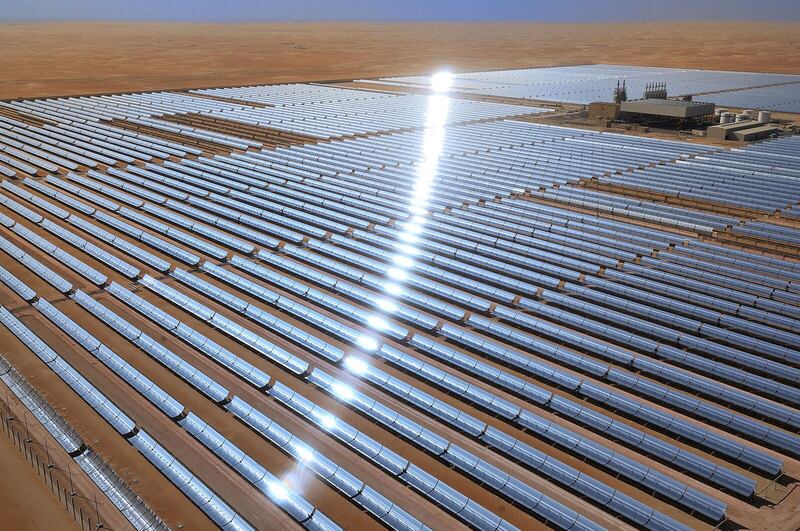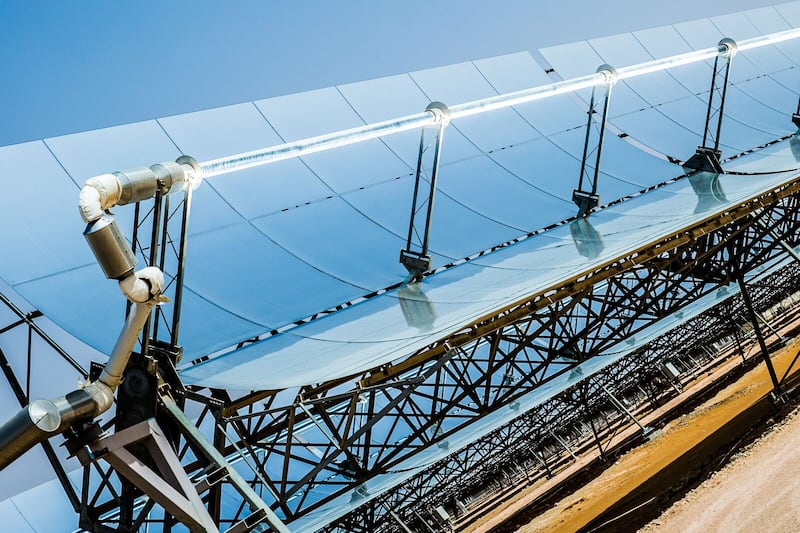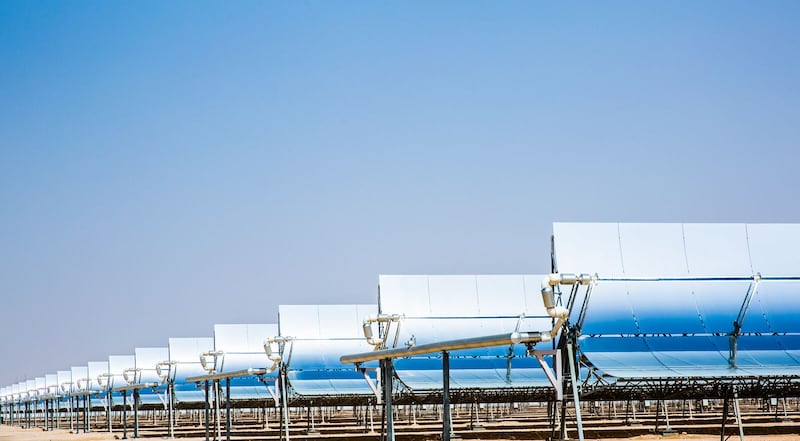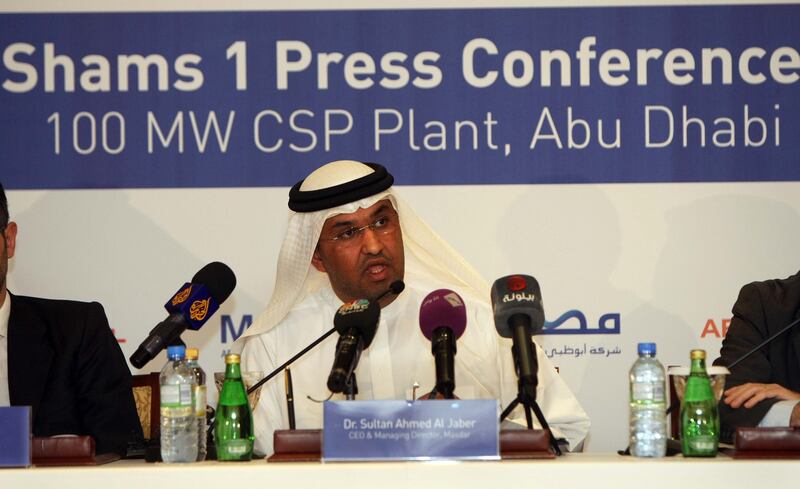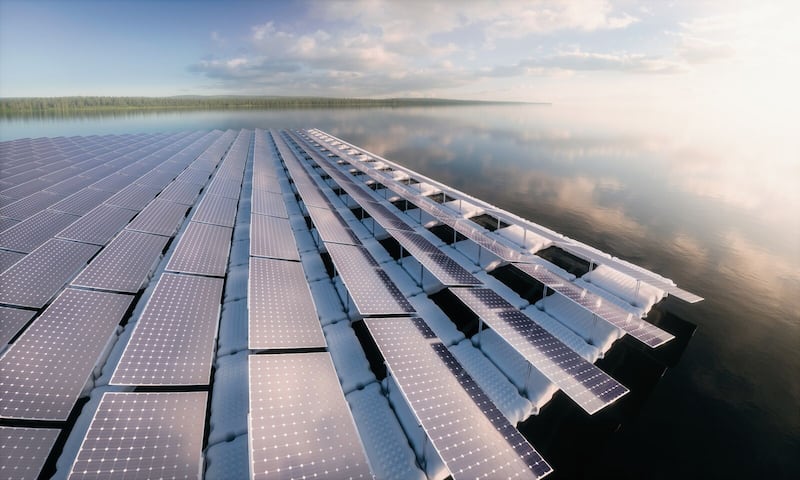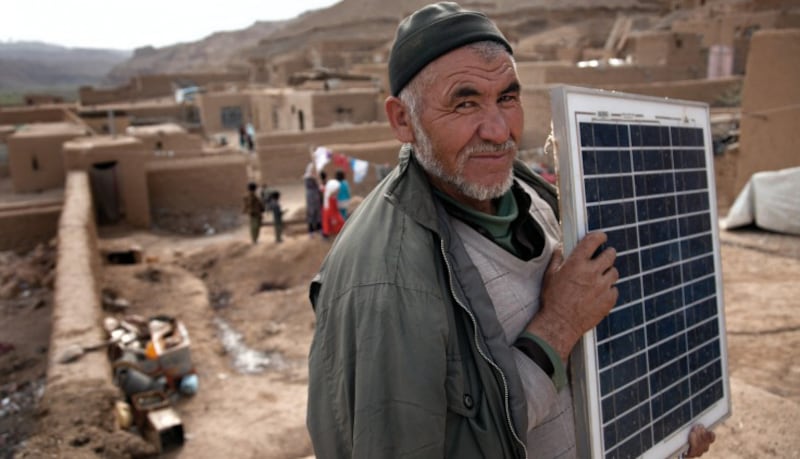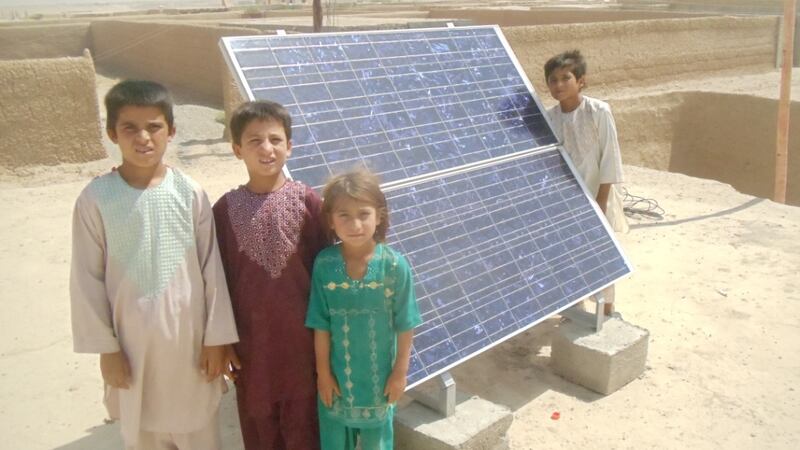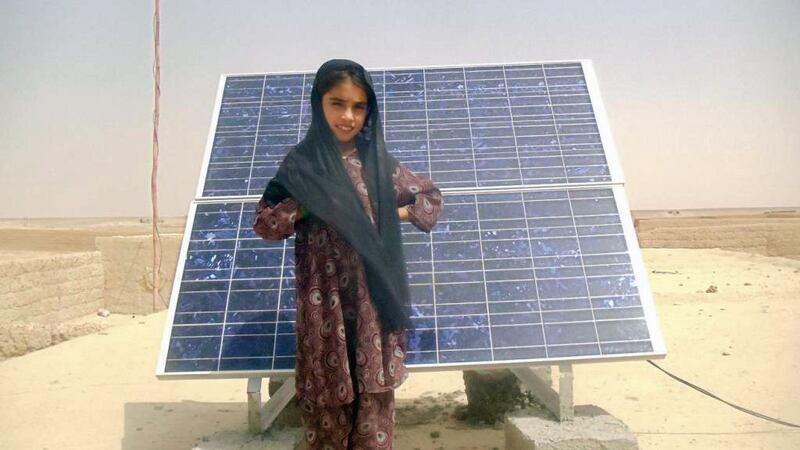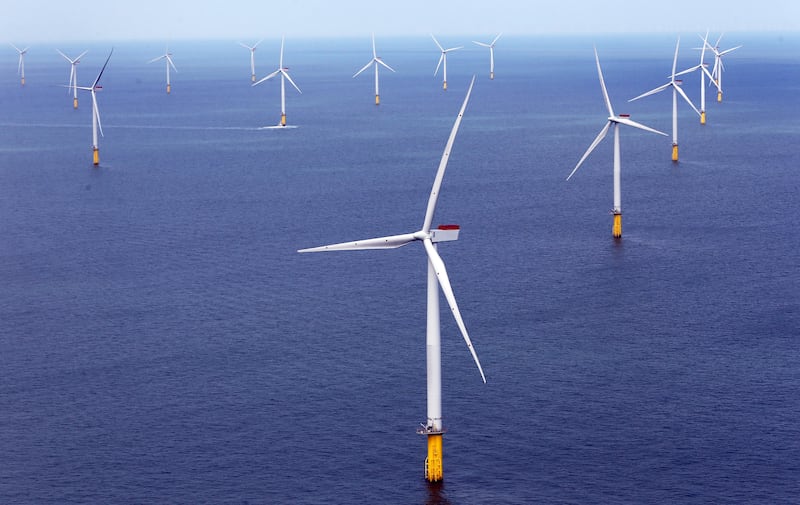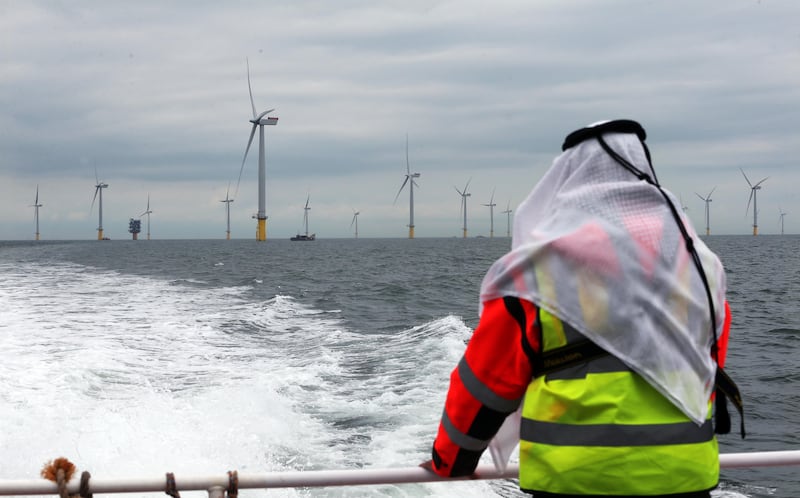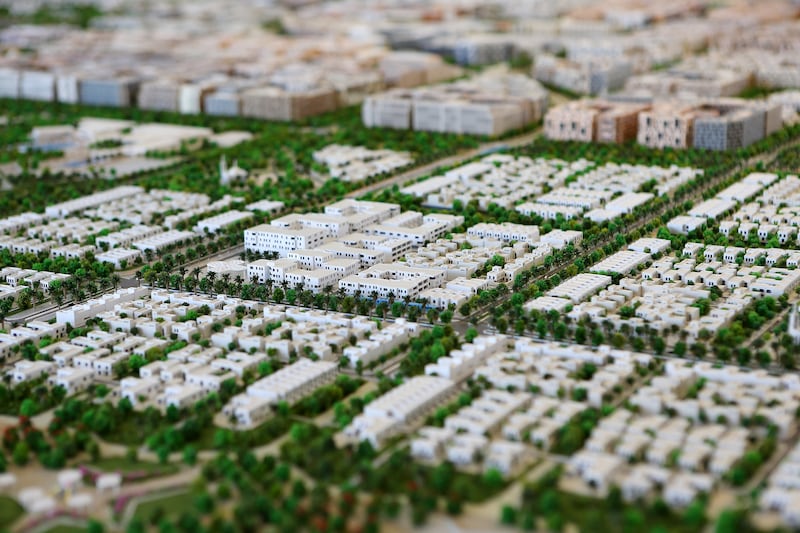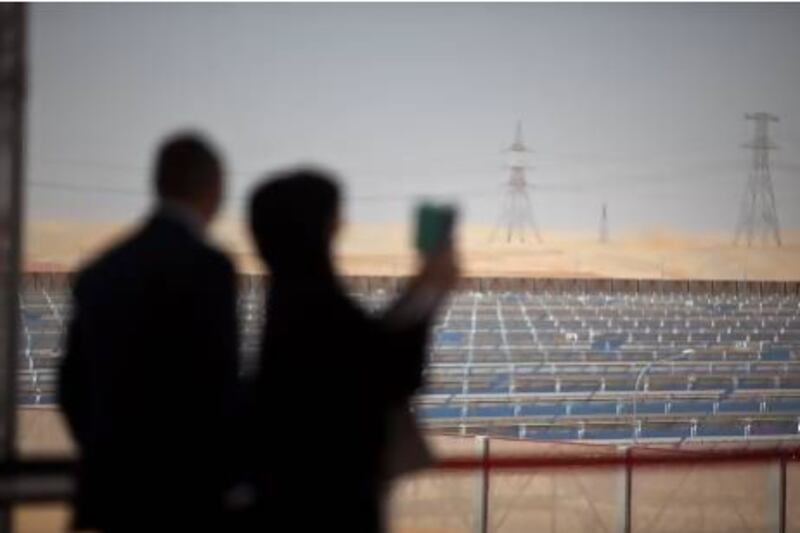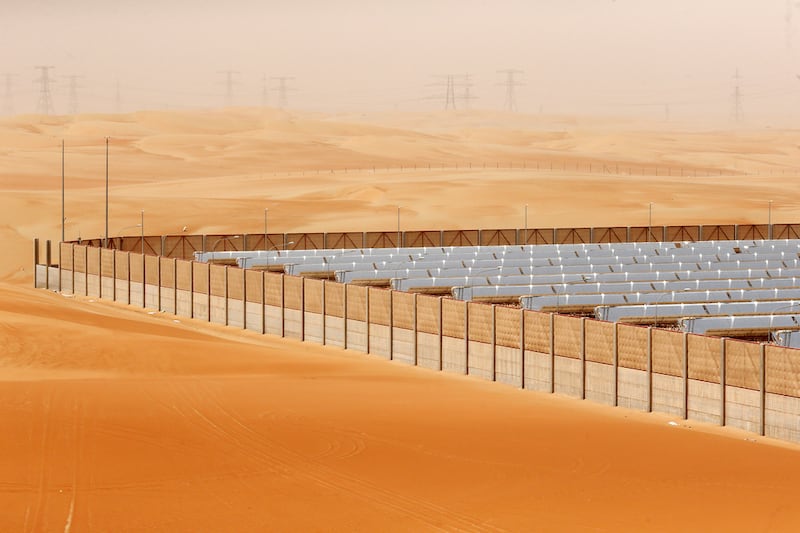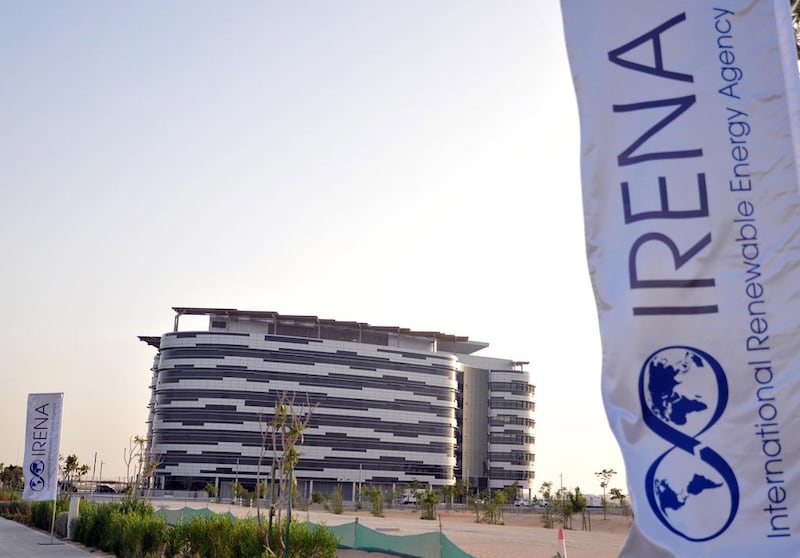A two-hour drive south-west of Abu Dhabi brings you to a place where the endless desert meets the blue sky.
But as the road continues into Al Dhafra, rows and rows of iridescent mirrors start to shimmer on the horizon.
This is no desert mirage, but Shams 1, a solar plant that is the future of power.
Launched by Masdar (Abu Dhabi Future Energy Company) in 2013, the 100 megawatt plant provides clean electricity to 20,000 homes.
It also aims to reduce the UAE’s carbon footprint by displacing about 175,000 tonnes of carbon dioxide a year, equal to planting 1.5 million trees or removing 15,000 cars from Abu Dhabi’s roads.
Shams 1 was the largest solar plant of its type in the world when it opened and the symbolism of its location could not have been clearer. Al Dhafra was home to Abu Dhabi’s fossil fuel industry and the historic heart of the emirate’s Bedouin traditions.
But now, alongside oil derricks, gas fields and refineries, is a renewable energy plant that shows how an emirate often associated only with oil is overturning those perceptions.
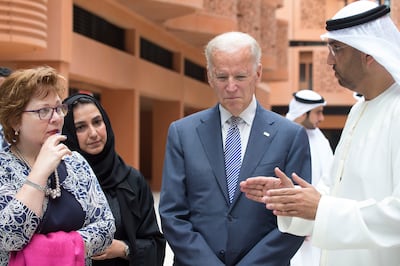
“The inauguration of Shams 1 is a breakthrough for renewable energy development in the Middle East,” said Dr Sultan Al Jaber, at the time chief executive of Masdar at the Shams launch in 2013. He is now Masdar’s chairman, UAE Minister of Industry and Advanced Technology and UAE Special Envoy for Climate Change.
“Investments in sophisticated projects like Shams 1 train our future energy leaders, create specialised jobs and encourage economic development,” Dr Al Jaber said.
“Clean energy is aligned with the legacy of conservation instilled in us by our Founding Father, Sheikh Zayed bin Sultan Al Nahyan.”
Almost a decade on, Masdar has become a global renewable energy powerhouse operating in at least 40 countries. As the UAE gears up to host the Cop28 summit in 2023, The National explores how Masdar is helping the world’s transition to clean energy with Dr Al Jaber at the helm.
From the Abu Dhabi desert to the world
The journey began in 2006 when Masdar, which means “source” in Arabic, was established. This was a time when the emirate was embarking on a new era of growth with major projects on Yas Island and Saadiyat kicking off. But even then, sustainability was important.
One of its first projects was Masdar City. Aimed to champion sustainable living, the city opened in 2010 and its buildings are designed to reduce energy and water use by 40 per cent compared with regular buildings. It is also home to the global headquarters of the International Renewable Energy Agency (Irena), Siemens Middle East and the Mohamed bin Zayed University for Artificial Intelligence. In June it was announced that the new Masdar City Square development at the city will include the capital's first net-zero office building.
Pioneering sustainable research and development projects have also been conducted there, such as its energy-storage systems and eco-villas.
“The vision of urban sustainability reflected in Masdar City and efforts to build a sustainable city are important,” said David Sandalow, a senior research scholar at Columbia University's Centre on Global Energy Policy in the US. “I’ve always been impressed by it.”
Development of Masdar City is ongoing and it is often the project many people think of when they hear Masdar. But since those early years, the company has expanded from its Abu Dhabi base. It has helped to start wind farms in Texas, waste-to-energy plants in Australia and solar projects in Afghanistan. Rooftop panels installed in homes, schools, mosques and clinics in about a dozen villages in Helmand Province, for example, have improved the lives of 3,000 people who previously had no access to electricity.
Masdar also helped to establish London Array, one of the world's largest offshore wind farms, and also the world’s first floating offshore windfarm, Hywind. Located off the coast of Scotland, Hywind opened in 2017 and provides 22,000 homes with clean electricity.
“Masdar is an important force globally,” Mr Sandalow said. “In dozens of countries, [Masdar] is providing important capital and important expertise [for] the clean energy transition.”
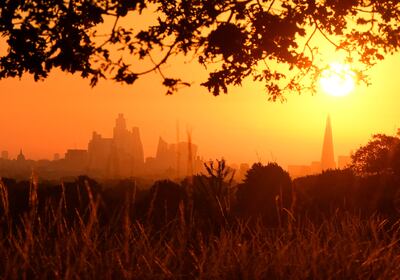
The UAE, Masdar and the fight against climate change
This year extraordinary heatwaves scorched parts of the world. Temperatures passed 40ºC in the UK for the first time in history. Extreme heat also affected countries including India, the US, Australia, Spain, Germany and China. Scientists predict that these events will become more common.
“As a world we are not moving close to quick enough to address the threat of climate change,” said Mr Sandalow, who also served in senior positions at the White House, State Department and US Department of Energy. “Parts of the world could become literally uninhabitable in the decades ahead.”
The UAE, a member of Opec, in 2021 declared its intent to become a net zero emitter of emissions by 2050. It also announced an ambitious plan to invest Dh600 billion ($163.3bn) in clean and renewable energy sources over the next three decades. The UAE aims by 2050 to have an energy mix of 44 per cent clean energy; 38 per cent gas; 12 per cent clean coal; and 6 per cent nuclear.
The country will also host the Cop28 global climate summit at Expo City Dubai in 2023, following Cop27, which is being hosted by Egypt this November. These conferences aim to help countries stick to limiting global warming to 2ºC above pre-industrial levels and try to keep it to 1.5ºC as envisaged by the 2015 Paris climate agreement.
“These Cops are critically important,” Mr Sandalow said. “The good news is we have technologies that can make a major difference in addressing this challenge. The bad news is emissions are still rising. That’s why initiatives like Masdar are so important.”
Mr Sandalow said climate change is an “exceedingly difficult” political issue to convey but through a combination of strong statements from leaders, showcasing economic opportunities and underscoring the reality of climate change can help. Additionally, the symbolism of the UAE, a historic oil supplier and home of Abu Dhabi National Oil Company (Adnoc), hosting a crucial global climate summit should not be lost on anyone.
“Cop28 will focus the attention on the role of the oil and gas sector in a cleaner energy transition,” Mr Sandalow said. “Oil and gas producers know how to deploy capital and extraordinary amounts of technology. We need those areas of expertise focused on new forms of energy. That’s exactly the type of activity Adnoc and Masdar can play an important role in.”
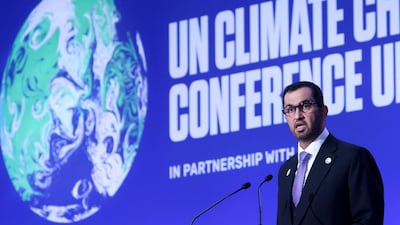
Dr Sultan Al Jaber's long-standing commitment to renewables
Dr Al Jaber's many roles, he is also chief executive of Adnoc, put him at the forefront of the climate change battle. Speaking at the Middle East and North Africa Climate Week 2022, Dr Al Jaber said building a greener tomorrow takes time and hasty policies that pushed people into energy poverty would not work.
“Alongside renewables, we need nuclear, natural gas and oil from parts of the world where it takes the least amount of carbon to produce,” he said. “We should not be adopting policies that lead to energy poverty.”
The UAE enjoys the world’s lowest-cost solar power and plants such as Shams 1 help to achieve this goal. It is also the first Arab country to develop a peaceful nuclear energy programme.
Dr Al Jaber outlined the UAE’s longstanding commitment to fighting climate change; its provision of more than $1 billion in climate aid to more than 40 countries; and its historic commitment to the environment, such as ending flaring.
“I’ve been very impressed with the leadership of Sultan Al Jaber on this,” Mr Sandalow said. “He combines a real commitment to the clean energy transition with sophistication about how the current oil and gas markets work.”
Masdar-backed floating wind turbines brings more power to UK
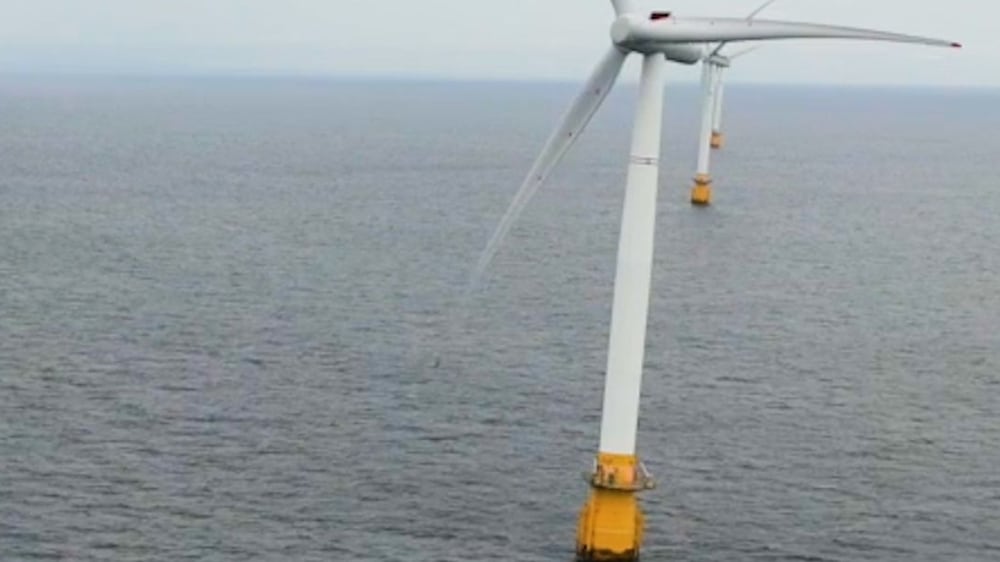
How Masdar is building a greener tomorrow
Masdar invests in or has committed to clean energy projects worth $20 billion with a generation capacity of more than 15GW (in operation or under development), displacing 7.5 million tonnes of CO2 per year.
Abu Dhabi energy powerhouses Adnoc and Taqa, are also shareholders in the company alongside Mubadala, bolstering Masdar’s aims to reach more than 100GW in total global capacity by 2030.
In the first six months of 2022 alone, the company signed agreements to explore and develop renewable energy and green hydrogen projects with a combined capacity of more than 10GW and it is constantly seeking new areas to expand into and renewable projects to assist with as the world tackles climate change.
"Back in 2006, some thought launching Abu Dhabi’s Future Energy Company, Masdar, was a strange move for a major oil-producing nation," Dr Al Jaber said in 2021.
"Yet, Sheikh Mohamed bin Zayed [The President] knew where the world was heading and wanted to get ahead of the curve. In fact, our leadership viewed investment in clean, renewable energy as a natural and logical extension of Abu Dhabi and the UAE’s role as a global energy leader and an opportunity to develop new partnerships, new knowledge, new skills and new jobs," Dr Al Jaber said.
“We should embrace this transition as a unique opportunity for growth.”
